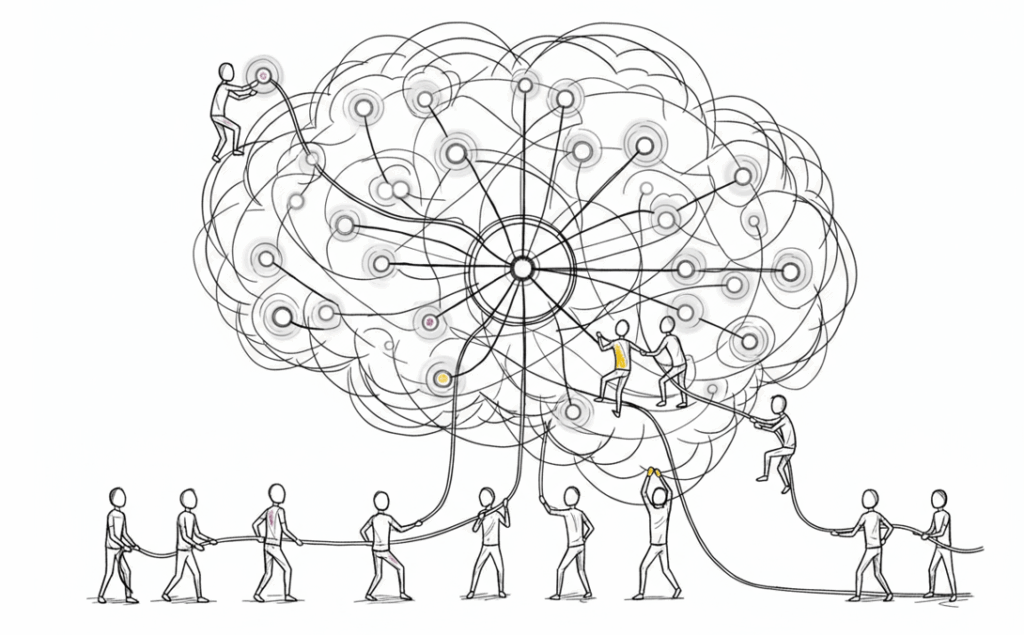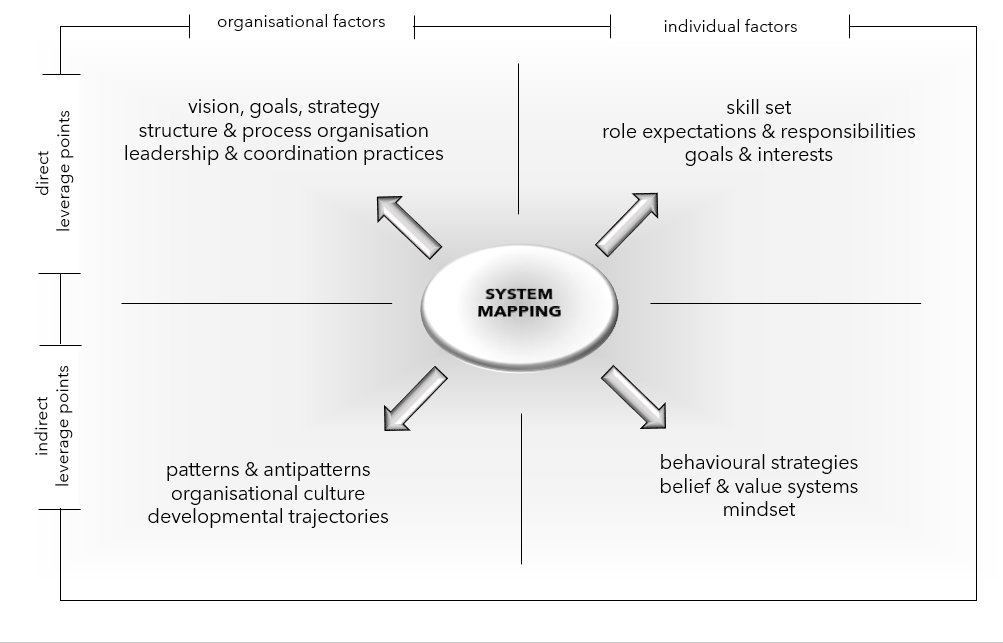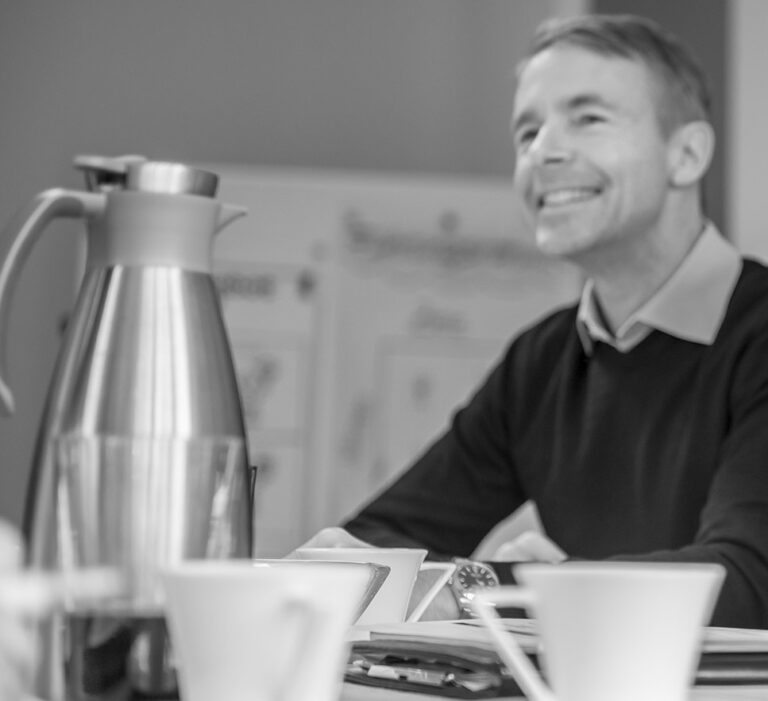Designing Resilient and Adaptive Organisations
Designing resilient and adaptive organisations means aligning structures, culture, and leadership with strategic foresight. In our organizational consulting we help you develop effective change measurse without losing sight of what existing solutions and ressources.
By integrating strategy, structure, and leadership into a coherent system we enhance performance, motivation, and innovation capacity – creating the foundation for healthy growth and long-term success in an ever-changing business environment.


@ ChangeLab Organisationsberatung
Organisations are complex social systems. Meaningful and sustainable organisational change can only succeed when the underlying system logic is understood and taken into account. In our change management consulting, we view your objectives through a systemic lens rather than as isolated goals. We work with a clear understanding of the key context factors that shape organisational dynamics — from structures and decision-making pathways to leadership practices, role expectations, and informal patterns of interaction. Drawing on our expertise in systems theory and organisational sociology, we identify antipatterns, critical interdependencies and systemic blind spots. Our change strategy: Roadmapping high impact change processes by developing finely tuned and well-synchronized change measures.
An equally crucial factor for successful organizational development is the intentional design of the psychosocial dynamics within change processes. Sustainable change can only succeed when employees are not merely informed but actively engaged and empowered to participate. For us, professional change facilitation means turning those affected into true stakeholders—through transparent decision-making, structured dialogue spaces, and integrative participation formats.
Our clients contribute valuable operational and strategic expertise to the organizational development process. We view this diversity of perspectives as a key resource for creating well-grounded, tailored interventions that align precisely with the unique logic and needs of your organization.
We draw on modern, human-centered methods such as design thinking, collaborative prototyping, and systemic facilitation techniques.This approach fosters shared ownership and builds the foundation for a resilient and adaptable organizational culture.
There are no simple if-then rules in change processes. Successful change processes therefore thrive on a balance between stringency and adaptability. This is why we apply a great deal of constructive energy and, if necessary, a pinch of persistence to ensure that the change measures are consistently implemented and regularly evaluated. At the same time real and lasting change always entails embarking on a collaborative learning journey and making important adjustments when necessary. This is why rigorous adaptability a core element of our consulting philosophy—because meaningful change requires both direction and discovery. For our clients, this means achieving results that are robust, sustainable and truly aligned with their evolving needs.
In a dynamic market environment, you need teams that face challenges proactively and developing innovative solutions when necessary. With the right agile practices, you can increase the self-organization capability and flexibility of your teams. At least as important as the right practices is, however, the attitude with which these practices are applied. We help you integrate agile principles into your corporate culture and thus strengthening the solution orientation and adaptability of your entire company.
There is hardly any area of cooperation that remains untouched by a company's leadership culture. Developing your company's leadership culture therefore means harnessing the power of a constructive leadership culture to unleash your company's full potential.
Trying to change a management culture by decree, however, is doomed to failure from the outset. So what viable alternative is there? How can you succeed in developing your company's leadership culture?
An attractive leadership mission statement is a good first step. Left to its own devices, however, a leadership mission statement quickly runs the risk of degenerating into mere lip service. Sustainable change begins when leaders start filling the mission statement with life. A decisive aspect of successful leadership culture development is therefore the synchronization of the leadership mission statement and leadership practices.
A strong start is important — but real impact comes from taking the next step. Every deep transformation inevitably creates a gap between intention and capability. Closing this gap effectively requires professional leadership enablement.
We see leadership development as an integral part of any successful leadership culture transformation. Through targeted development programs, practical learning formats and continuous guidance, we support your leaders in embedding new mindsets, capabilities and behaviors sustainably.
Equally essential are structured spaces for reflection, where goals, progress and individual development paths are reviewed regularly. This creates a learning-oriented, future-ready leadership culture that aligns with your organization’s values, strategic priorities and operational demands.


With the increasing complexity and volatility of today's market dynamics, companies can rely less and less on the performance of outstanding individuals. In order to remain competitive, the resources, expertise and cooperation of entire teams are required. Cooperative teamwork with a strong commitment to the overarching team goals, independent action and solution-oriented thinking - this is the goal and aspiration of most team leaders, and often of most team members too.
Teamwork, however, doesn’t always meet the desired and necessary standards. Never ending discussions with ambiguous results, unclear responsibilities, an ineffective workflow – stress factors that have high costs. Among the most typical costs are bottle necks, high mistake margins and frequent team conflicts.
Dysfunctional team patterns often stem from unclear roles, unspoken expectations, or entrenched communication structures. If these dynamics are not identified early, they can erode motivation, performance, and trust over the long term.
A crucial step in successful team development is therefore making dysfunctional patterns visible — both at the structural and interpersonal level. Viewing antipatterns through a systemic lens, we create transparency around the root causes of team challenges, establishing the foundation for targeted development initiatives that restore effectiveness, enable solution-oriented collaboration and strengthen the team’s overall performance.
With the right team development measures, you foster a respectful, collaborative and results-driven work environment— creating the foundation for your team to reach its full performance potential.
We design team development processes aligned to your team’s history, current dynamics and your specific development and business goals. Through systematic analysis and targeted interventions, we help your team build clarity, trust and highly effective collaboration.